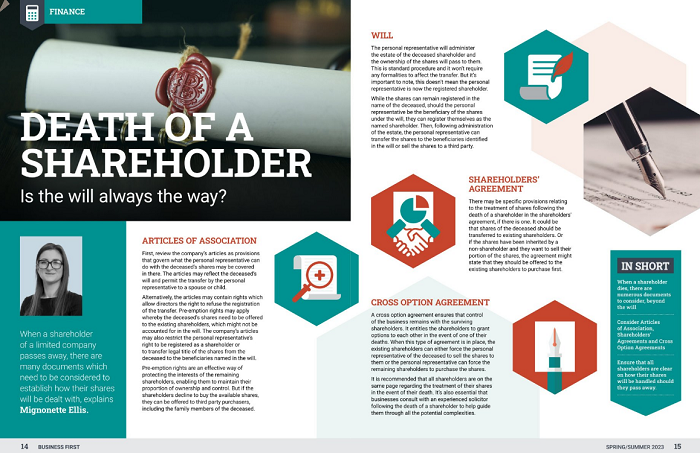We're hiring! if you'd like to join one of our award winning teams, read more on our Careers page.
There are documents which need to be considered following the death of a shareholder of a limited company to establish how their shares will be dealt with.
Articles of Association
Provisions which govern what the personal representative can do with the deceased’s shares may be included in the company’s articles therefore these should be reviewed.
It may be the case that the articles reflect the deceased’s Will, for example the Articles permit the transfer by the personal representative to a spouse or child and this is the case in the deceased’s Will.
The Articles may contain rights which will allow directors to have the right to refuse the registration of the transfer or pre-emption rights may apply whereby the deceased’s shares need to be offered to the existing shareholders which may not be accounted for in the deceased’s Will. The articles may also restrict the personal representative right to be registered as a shareholder or generally to transfer legal title of the shares from the deceased to the beneficiaries named in the Will.
Pre-emption rights are in effective way to protect the interests of the remaining shareholders, enabling them to maintain their proportion of ownership and control. If the shareholders decline to buy the available shares they can be offered to third party purchasers including family members of the deceased.

Will
The estate of the deceased shareholder will be administered by the personal representative and the ownership of the shares will pass to them. This is standard procedure and will not require any formalities to effect the transfer however, this does not mean that the personal representative is registered as the new shareholder.
The shares can remain registered in the name of the deceased however if the personal repetitive is the beneficiary of the shares under the Will, they can chose to be the registered shareholder.
Following administration of the estate the personal representative would then transfer the shares to the beneficiaries identified in the Will or sell the shares to a third party.
Shareholders Agreement
There may be a shareholders agreement in place and if there is it should be checked for specific provisions relating to the treatment of shares following the death of a shareholder. There may be provisions which require the shares of the deceased to be transferred to existing shareholders on death. Alternatively, if the shares have been inherited by a person who is not a shareholder and they want to sell the shares, shares are to be offered to the existing shareholders first.
Cross Option Agreement
This agreement is used to ensure the control of the business remains with the surviving shareholders. The document entitles the shareholders to grant options to each other in the event of one of their deaths. Under this type of agreement, the existing shareholders can either force the personal representative of the deceased to sell the available shares to them or the personal representatives of the deceased can force the remaining shareholders to purchase the available shares.
It is important that an experienced solicitor is instructed to assist following the death of a shareholder to guide you through potential complexities which may arise due to the interconnectedness of the above mentioned documents.
It would be prudent to ensure that all shareholders are on the same page regarding the treatment of their shares in the event of their death.
There are other documents which may need to be considered therefore you will want to consult a suitable legal advisor to navigate the next steps.



 Andrew Ashley-Edwards
Andrew Ashley-Edwards Khalid Mughal
Khalid Mughal
Comments